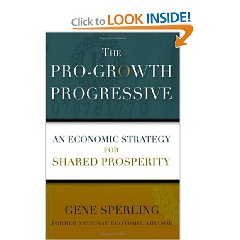There is no question but that Gene Sperling performed ably for President Clinton EXCEPT that he sacrified the American worker by opening the door for broad indiscriminate lay-offs (see my review of The Disposable American: Layoffs and Their Consequences by Louis Uchitelle) and he evidently did not see the economic urgency of completely recasting our national educational system (including exile of the stake-holders in the old system to Chinese re-education camps near Mongolia).
On balance, Sperling is now one of those “has experience, listen to him” guys, but he is part of the last gasp of the old guard in the Democratic party, and for my money, a combination of Return of Rubin and Elevation of Matthew Miller would do more good. See my reviews of the books by both these stars.
The author lacks real familiarity with emergent technologies, especially bio-technologies that are CRTICIAL to reducing poverty and illiteracy (see my review of Tofflers Revolutionary Wealth: How it will be created and how it will change our lives), and over-all the book does not represent a comprehensive strategy that reflects an understanding of system dynamics, both internal to the Republic and globally.
Bottom line: worth reading, 30% of this will be useful, somewhat tired. Rubin is more mature, Miller more innovative. Sperling needs to be in the car, but not driving.





